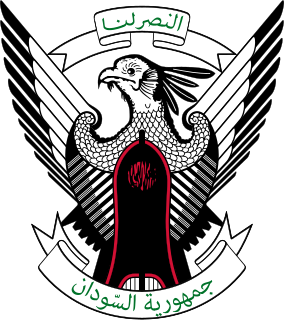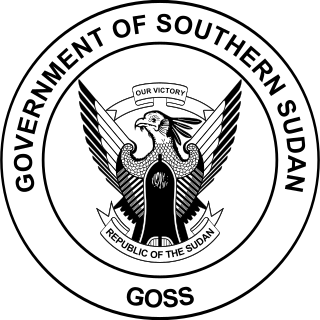Related Research Articles

The Politics of Eritrea and the Government of Eritrea takes place in a framework of a single-party presidential republican totalitarian dictatorship. The President officially serves as both head of state and head of government. The People's Front for Democracy and Justice is the only political party legally permitted to exist in Eritrea. The popularly elected National Assembly of 150 seats, formed in 1993 shortly after independence from Ethiopia, elected the current president, Isaias Afewerki. There have been no general elections since its official independence in 1993. The country is governed under the constitution of 1993. A new constitution was ratified in 1997, but has not been implemented. Since the National Assembly last met in January 2002, President Isaias Afwerki has exercised the powers of both the executive and legislative branches of government.

Currently, the politics of Sudan takes place in the framework of a federal provisional government. Previously, a president was head of state, head of government, and commander-in-chief of the Sudanese Armed Forces in a de jure multi-party system. Legislative power was officially vested in both the government and in the two chambers, the National Assembly (lower) and the Council of States (higher), of the bicameral National Legislature. The judiciary is independent and obtained by the Constitutional Court. However, following a deadly civil war and the still ongoing genocide in Darfur, Sudan was widely recognized as a totalitarian state where all effective political power was held by President Omar al-Bashir and his National Congress Party (NCP). However, al-Bashir and the NCP were ousted in a military coup which occurred on April 11, 2019. The government of Sudan was then led by the Transitional Military Council or TMC. On 20 August 2019, the TMC dissolved giving its authority over to the Sovereignty Council of Sudan, who were planned to govern for 39 months until 2022, in the process of transitioning to democracy. However, the Sovereignty Council and the Sudanese government were dissolved in October 2021.

Darfur is a region of western Sudan. Dār is an Arabic word meaning "home [of]" – the region was named Dardaju while ruled by the Daju, who migrated from Meroë c. 350 AD, and it was renamed Dartunjur when the Tunjur ruled the area. Darfur was an independent sultanate for several hundred years until it was incorporated into Sudan by Anglo-Egyptian forces in 1916. As an administrative region, Darfur is divided into five federal states: Central Darfur, East Darfur, North Darfur, South Darfur and West Darfur. Because of the War in Darfur between Sudanese government forces and the indigenous population, the region has been in a state of humanitarian emergency and genocide since 2003. The factors include religious and ethnic rivalry, and the rivalry between farmers and herders.

In typical elections, Sudan elects on a national level head of state - the president - and a legislature. In the election of 2010, there were two presidential elections, one for the Presidency of the Republic of Sudan and one for the Presidency of the Government of Southern Sudan. Elections for the unicameral, 360-member National Assembly were last held in April 2015.

Malakal is a city in South Sudan. It is the capital of Upper Nile State, South Sudan, along the White Nile River. It also serves as the headquarter of Malakal county and it use to be the headquarter of Upper Nile Region from 1970s to late 1990s.

Government of Sudan is the federal provisional government created by the constitution of Sudan having the executive, parliament, and the judiciary. Previously, a president was head of state, head of government, and commander-in-chief of the Sudanese Armed Forces in a de jure multi-party system. Legislative power was officially vested in both the government and in the two chambers, the National Assembly (lower) and the Council of States (higher), of the bicameral National Legislature. The judiciary is independent and obtained by the Constitutional Court. However, following a deadly civil war and the still ongoing genocide in Darfur, Sudan was widely recognized as a totalitarian state where all effective political power was held by President Omar al-Bashir and his National Congress Party (NCP). However, al-Bashir and the NCP were ousted in a military coup which occurred on April 11, 2019. The government of Sudan was then led by the Transitional Military Council or TMC. On 20 August 2019, the TMC dissolved giving its authority over to the Sovereignty Council of Sudan, who were planned to govern for 39 months until 2022, in the process of transitioning to democracy. However, the Sovereignty Council and the Sudanese government were dissolved in October 2021.

The politics of South Sudan concerns the system of government in the Republic of South Sudan, a country in East Africa, and the people, organizations, and events involved in it.

General elections were held in Sudan between 11 and 15 April 2010, extended from the original end date of 13 April. The elections were held to elect the President and National Assembly of Sudan, as well as the President and Legislative Assembly of Southern Sudan. The election brought to the end the transitional period which began when the decades-long Second Sudanese Civil War ended in 2005.

The coat of arms of the Republic of South Sudan was adopted in July 2011 following independence from the Republic of Sudan. Prior to independence, South Sudan was an autonomous region of Sudan.

The Southern Sudan Legislative Assembly was established in 2005 by the Interim constitution of the Southern Sudan 2005. Pending elections in 2010, all 170 members were appointed according to the following formula as per the Comprehensive Peace Agreement (CPA): 70% of seats to SPLM, 15% to NCP, and 15% to other parties. The Assembly met in Juba, The capital of Southern Sudan and Central Equatoria State.

David Deng Athorbei, also sometimes wrongly referred to as David Deng Athorbie, is a South Sudanese politician and civil servant. Presently he is a member of parliament representing Yirol West. He has been Minister for Finance and Economic Planning, Minister of Roads, and Minister of Dams and Electricity in independent South Sudan.
Louis Lobong Lojore is a South Sudanese Politician and a military governor in the rank of brigadier general in the South Sudan People's Defence Forces (SSPDF) and the current governor of Eastern Equatoria State in South Sudan. He was the governor of Eastern Equatoria state from 2010-2015, governor of Kapoeta State from 2015-2020, and has been the governor of the recreated Eastern Equatoria state since 29 June 2020. Lobong is the longest serving governor in South Sudan.

James Wani Igga is a South Sudanese serving as the 2nd Vice President of South Sudan. He was Speaker of the National Legislative Assembly from 2011 to 2013 and Secretary General of the Sudan People's Liberation Movement. On 30 May 2020, he tested positive for COVID-19.
The Lakes State Legislative Assembly (LSLA) is the legislative assembly of Lakes state in South Sudan. The body is composed of 48 Members of Parliament; 29 representing geographic constituencies, 12 elected from women's list and 7 elected from party list. The assembly is based in the state capital Rumbek. Elections to LSLA was held in 2010, in which 46 Sudan People's Liberation Movement candidates were elected and two independents.
Zakaria Chol Gideon Gakmar was a Sudanese politician, belonging to the Sudan People's Liberation Movement (SPLM). He was elected to the Lakes State Legislative Assembly in the 2010 election as a candidate on the SPLM party list.

The following outline is provided as an overview of and topical guide to South Sudan:
Abraham Makoi Bol has been the Governor of Western Lakes State, South Sudan since 24 December 2015. He is the first governor of the state, which was created by President Salva Kiir on 2 October 2015.
Shadrack Bol Machok is a South Sudanese politician. He was elected to the Lakes State Legislative Assembly in 2010.
Zechariah Puoric Matuong Biet is a South Sudanese politician. He was elected to the Lakes State Legislative Assembly in 2010.
This article lists events from the year 2019 in South Sudan
References
- ↑ "المفوضية القومية للانتخابات". Archived from the original on 2010-07-07. Retrieved 2010-07-07.
- ↑ "Lakes state parliament opens its second session - Sudan Tribune: Plural news and views on Sudan".
- ↑ http://www.thejubapost.org/index.php?option=com_content&view=article&id=67:chol-sworn-in-as-lake-state-governor&catid=1:latest-news&Itemid=53%5B%5D